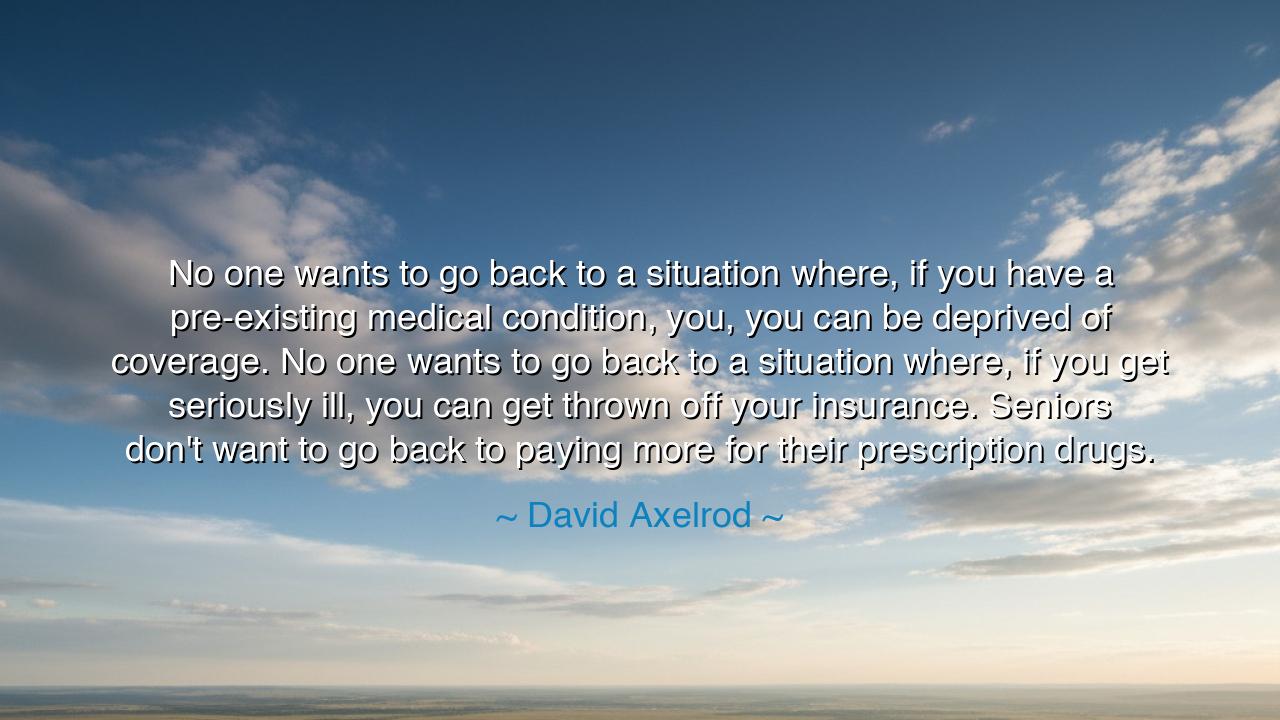
No one wants to go back to a situation where, if you have a
No one wants to go back to a situation where, if you have a pre-existing medical condition, you, you can be deprived of coverage. No one wants to go back to a situation where, if you get seriously ill, you can get thrown off your insurance. Seniors don't want to go back to paying more for their prescription drugs.






Hearken to the words of David Axelrod, a voice echoing through the corridors of governance and the conscience of a people. He warns against a return to a time when the most vulnerable among us—those with pre-existing medical conditions—could be deprived of coverage, when the sick could be thrown off insurance, and when seniors faced unbearable costs for their prescription drugs. In this admonition lies a timeless truth: society’s strength is measured not by wealth or power alone, but by how it protects its infirm, its elderly, and its most defenseless.
Since the dawn of civilization, rulers and councils have struggled with the balance between resources and compassion. In ancient Athens, the city provided care for injured soldiers returning from war, yet such protection was limited and conditional, often leaving the weakest without support. Axelrod’s words echo across time: justice and mercy demand that health and well-being are not privileges contingent on fortune or circumstance, but rights to be safeguarded. To deny care to the sick is to undermine the very fabric of a community.
Consider the story of the Great Influenza of 1918, when millions fell ill across the globe. Those without access to medical care often perished, while the fortunate few survived with assistance. The disparity revealed a moral truth: illness does not discriminate, yet society often does. Axelrod’s warning reflects this same understanding—the call to prevent a return to a system where vulnerability invites neglect and where need alone dictates access to life-saving care.
Axelrod also speaks to the plight of the aged, reminding us that seniors do not wish to return to paying more for prescription drugs. In antiquity, elders were revered, yet in practice they often struggled to secure their sustenance and medicine. To honor the aged is not merely to pay homage, but to ensure their dignity and well-being. Axelrod’s observation underscores a principle the ancients knew well: a society is judged by how it treats those who have borne the burdens of life and contributed wisdom to the community.
In modern times, this principle manifests in policies that protect pre-existing conditions and provide continuity of care. Without such safeguards, families live in fear that illness could destroy both health and financial stability. Axelrod reminds us that security, compassion, and justice in healthcare are inseparable; the measure of reform is not only in legislation but in the protection it offers to the most vulnerable among us.
History teaches that progress must be defended. The Social Security Act of 1935 in America, though imperfect, reflected a societal commitment to care for the elderly and infirm. Similarly, modern healthcare protections echo this ancient ethos: safeguard life, prevent hardship, and relieve suffering, so that fear does not dictate daily existence. Axelrod’s words resonate with the ancient recognition that moral society requires proactive measures to shield the weak.
The lesson for us today is clear: strive for systems that protect, provide, and preserve. Advocate for policies that guarantee access to care, honor the contributions of the elderly, and secure the dignity of the sick. Recognize that a compassionate society invests in the health of all, understanding that vulnerability is universal and that neglect erodes the moral foundation of civilization.
Thus, heed the wisdom of David Axelrod: do not retreat to a time of fear and exclusion. Let the protection of the infirm, the elderly, and those with chronic conditions be our guiding principle. In safeguarding healthcare and access to medicine, we uphold not only the lives of individuals, but the enduring strength, justice, and honor of the community itself—a legacy that reverberates across generations.






AAdministratorAdministrator
Welcome, honored guests. Please leave a comment, we will respond soon